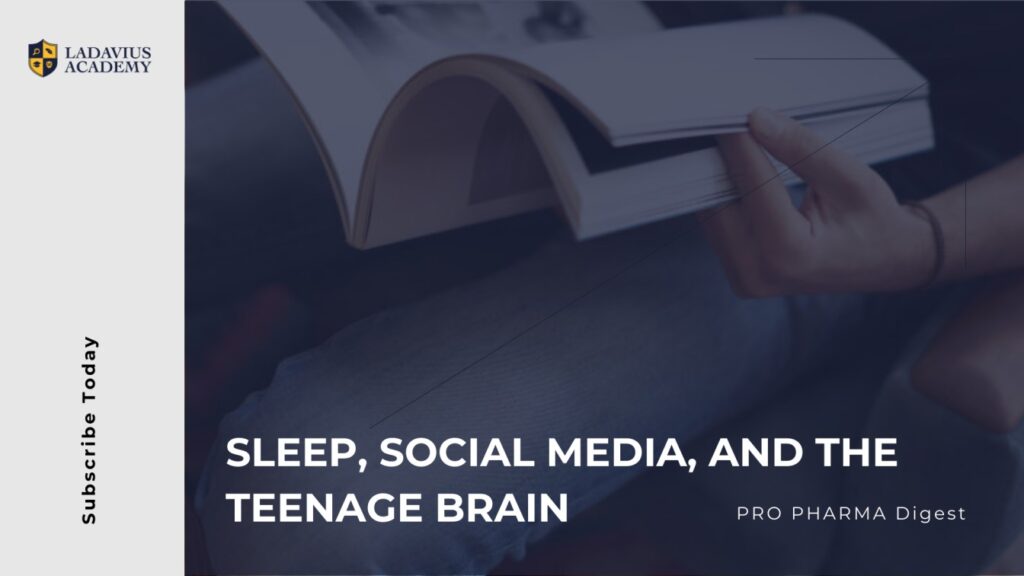A study by Orsolya Kiss, PhD, a research scientist at SRI International, investigated how sleep duration, social media use, and brain activity interact in adolescents. The findings suggest a complex interplay between these factors, potentially impacting brain development.
Key Findings
- Teens who slept less tended to use social media more. This correlation, as reported by Kiss et al., implies a potential cause-and-effect relationship, but the study design can’t definitively prove which behavior influences the other. It’s possible that teenagers who are sleep-deprived for other reasons (like stress or health conditions) turn to social media as a coping mechanism, or that the blue light emitted from screens disrupts sleep patterns, leading to a need for more social media use during waking hours.
- Greater social media use was linked to reduced activity in brain regions crucial for decision-making and self-control. These regions, located in the prefrontal cortex, are essential for skills like planning, impulse control, and emotional regulation. This finding suggests that excessive social media use might hinder the development of these critical cognitive functions in teenagers, as highlighted by Kiss et al.
- Longer sleep duration was associated with increased activity in areas involved in reward processing. The brain areas identified in this study, including the nucleus accumbens and striatum, are part of the reward system, which motivates us to seek out pleasurable experiences. Adequate sleep may enhance the brain’s sensitivity to rewards, promoting positive reinforcement for healthy behaviors, according to the study by Kiss et al.
- The interaction between social media use and sleep duration seemed to influence brain activity in several regions linked to emotions, motivation, and reward. This suggests that both sleep and social media habits can work together to shape how teenagers respond to stimuli, perceive emotions, and experience motivation, as observed in the study by Kiss et al.
Teenage Vulnerability
Adolescence is a critical period for brain development, especially in areas related to emotions and rewards. The limbic system, which governs emotions and social bonding, matures rapidly during this time. However, the prefrontal cortex, responsible for self-control and planning, lags behind in development. This imbalance makes teenagers particularly susceptible to sleep deprivation and the allure of social media, as noted by Kiss et al. The constant stimulation and social validation provided by social media platforms can be highly rewarding for the developing brain, potentially leading to excessive use that disrupts sleep patterns and hinders the development of crucial cognitive skills.
The Sleep-Social Media Connection
The study by Kiss et al. highlights a potential vicious cycle. Insufficient sleep may lead teens to spend more time on social media, seeking stimulation or connection, and the blue light emitted from screens can further disrupt sleep patterns. Conversely, excessive social media use might replace sleep and other activities beneficial for cognitive development, such as playing sports or engaging in creative pursuits. These activities can promote relaxation, improve emotional regulation, and strengthen cognitive skills.
Promoting Healthy Habits
Understanding this complex relationship is crucial for supporting adolescent health. The authors, including Kiss et al., emphasize the importance of:
- Open communication: Discussing sleep hygiene practices as a family can be more productive than strict limitations on social media. Parents can work with their teens to establish consistent sleep schedules, create relaxing bedtime routines, and limit screen time before bed.
- Parental guidance: Equipping parents and teens with knowledge about sleep and navigating digital media landscapes can empower healthy choices. Parents can model healthy sleep habits, set clear expectations for social media use, and help teens develop coping mechanisms for dealing with stress and boredom, which might otherwise lead them to turn to social media.
Future Considerations
This research by Kiss et al. paves the way for further exploration:
- Impact on mental health: How do these factors, like sleep deprivation and excessive social media use, influence adolescent mental well-being? Are they linked to an increased risk of anxiety, depression, or other mental health challenges?
- Technology’s role: Could social media platforms be designed to promote healthy sleep habits? Nighttime filters that reduce blue light emission or features that encourage users to set screen time limits could be potential solutions.
- Alternative solutions: Might future technologies exist to monitor brain states and encourage sleep-supportive behaviors? For example, wearable devices or apps that track sleep patterns and offer personalized recommendations for improving sleep hygiene could be helpful tools.
Overall Significance
This study by Kiss et al. sheds light on the intricate connection between sleep, social media, and brain development in teenagers. By promoting healthy habits, exploring technological solutions, and conducting further research on the mental health implications, we can better support adolescents during this critical stage of growth.
Posted June 2024.
Subscribe to our newsletter
Personalised by your preferences, subscribe to our newsletters to get the best of the Pharmaceutical Industry news in your inbox.
